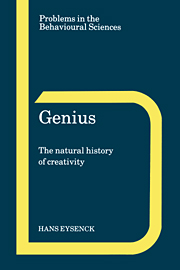Book contents
- Frontmatter
- Contents
- Introduction
- 1 The nature of genius
- 2 Genius and intelligence
- 3 Creativity: measurement and personality correlates
- 4 Conditions for excellence
- 5 Intuition and the unconscious
- 6 The nature of psychopathology: psychoticism
- 7 The roots of creative genius
- 8 From DNA to creativity and genius
- References
- Index
2 - Genius and intelligence
Published online by Cambridge University Press: 04 August 2010
- Frontmatter
- Contents
- Introduction
- 1 The nature of genius
- 2 Genius and intelligence
- 3 Creativity: measurement and personality correlates
- 4 Conditions for excellence
- 5 Intuition and the unconscious
- 6 The nature of psychopathology: psychoticism
- 7 The roots of creative genius
- 8 From DNA to creativity and genius
- References
- Index
Summary
Errors using inadequate data are much less
than those using no data at all.
Charles BabbageIntelligence – a dispositional variable
Few writings on genius have neglected to give intelligence a very high place, and indeed it is difficult to think of leading philosophers, scientists, writers, statesmen and artists other than highly gifted intellectually. But the opposite does not follow; not all people who are highly gifted intellectually turn out to be geniuses – were it otherwise the world would be overrun with geniuses! Intelligence is a dispositional variable, i.e. it enables a person with that ability to solve certain problems, produce certain results, achieve certain aims, but it does not guarantee success. Very early in the history of psychometric testing, Alexander (1935) analysed the relation between ability and school grades and discovered an ‘X’ factor, which was found to run through all the school subjects but through none of the ability measures. Alexander stated: ‘We are suggesting that X must be interpreted as a character factor which exercises an important influence on success in all school subjects. If we were to attach a name to this factor, we should be inclined to call it persistence.’
The distinction between a dispositional variable and what we might call an achievement variable (e.g. school success, production of a work of genius) is absolutely vital in understanding psychological analyses of abilities and traits. The distinction currently made between trait and state, say of anxiety, embodies the distinction.
- Type
- Chapter
- Information
- GeniusThe Natural History of Creativity, pp. 47 - 82Publisher: Cambridge University PressPrint publication year: 1995



